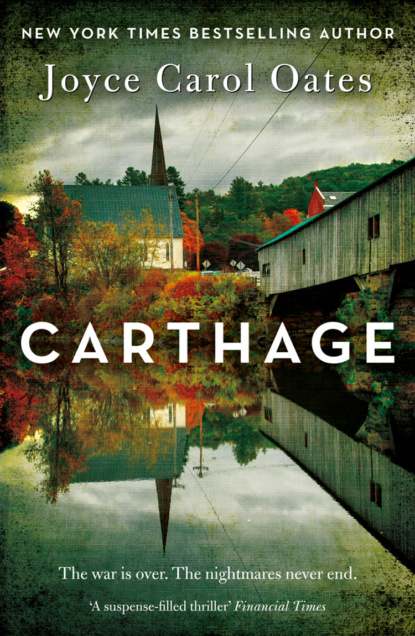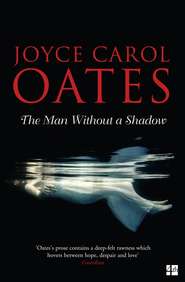По всем вопросам обращайтесь на: info@litportal.ru
(©) 2003-2024.
✖
Carthage
Автор
Год написания книги
2018
Настройки чтения
Размер шрифта
Высота строк
Поля
“HE’S OUT? He’s—home? Just like that—out on bail?”
Zeno was incredulous to learn that Brett Kincaid had been released from police custody after three days.
Yet more furious to learn that Brett hadn’t been released on bail—he’d never been arrested, no charges had been filed against him.
Preliminary bloodstain tests were inconclusive: Kincaid’s blood type was A positive, and some of the bloodstains in the passenger’s seat of his vehicle were type B positive, which was Cressida’s blood type; but there was no way to determine if the bloodstains were Cressida’s. Several hairs found in the front seat of the vehicle were “almost certainly” a match with Cressida’s hair and at least one fingerprint on the passenger’s door handle, though smudged, did appear to be a match with a print of Cressida’s taken from surfaces in her bedroom.
Bud McManus telephoned to explain why Kincaid had had to be released. Zeno slammed down the receiver.
“Fuckers! ‘Not enough evidence’ to hold him! That’s bullshit.”
Brett had been interviewed at length by detectives but had insisted that he didn’t remember much of what had happened on Saturday night at the Roebuck Inn, or afterward. He did seem to remember—vaguely—that someone had been with him in his Jeep; he thought he remembered having been drinking with his friends Halifax, Weisbeck, and Stumpf earlier; with the air of one straining to recall a disturbing and chaotic dream he managed to recall that whoever had been with him in his Jeep, a girl, or a woman, had wanted at some point to get out of the vehicle, that had skidded off a road—(he thought)—but he had not thought it was safe for her to climb out of the Jeep and into the wilderness at night and so—maybe—he’d had “some kind of struggle” with her.
Except maybe this wasn’t so. Maybe—that had happened some other time.
If it had happened, or whenever it had happened—he was very sorry.
His remarks were rambling and incoherent. His behavior was “erratic.” Several times he broke down sobbing. Several times he flew into a rage. He attempted to terminate the interview, and had to be forcibly restrained.
In the struggle, the chair he’d been sitting in, in the interview room, skidded out beneath him. He fell, heavily, onto the floor. Like a dead weight he lay for some stunned seconds with his stitched-together face pressed against the floor until police officers hauled him up.
O Christ he was sorry he was very sorry didn’t remember what had happened or which one of them but he was sorry and wanted to go home.
Still, he did not want a lawyer. He had not done anything wrong and so he did not want a God-damn lawyer.
He refused to eat. Or could not eat. He was able to drink Diet Coke in small careful swallows.
What he most wanted he said was to brush his teeth.
Except he didn’t have his toothbrush and he had no toothpaste.
His mother Ethel Kincaid arrived at the sheriff’s headquarters on Axel Road in a high state of excitation and protest. She’d brought with her a supply of the prescription drugs her son was obliged to take—(at least a dozen different medications, most of them more than once a day), medical reports and U.S. Army discharge documents. She brought her son’s Purple Heart and the Iraq campaign medal, in a chamois drawstring bag. In a loud voice she insisted that her son was innocent of any wrongdoing and that he should not be questioned as a “criminal suspect”; he was “unwell”—“under doctors’ care”—he’d been discharged with a “medical disability” from the army. He was a “corporal” and a “war hero” who should be treated with respect and he should certainly have a lawyer, a “free” lawyer, even if he seemed to think that he didn’t want one.
Mrs. Kincaid was allowed to confer with her exhausted and near-delirious son, who was still wearing the blood- and vomit-stained clothing in which he’d been apprehended early Sunday morning, and to weaken his resolve not to request a lawyer.
For Corporal Kincaid seemed to believe that only a guilty man would need a lawyer.
And if he had a lawyer, he would have admitted guilt.
Mrs. Kincaid succeeded also in convincing detectives that her son should be examined by a doctor; and that he must be released soon, to return to the rehab clinic for his prescribed therapy.
On Sunday afternoon and again on Monday detectives had come to Ethel Kincaid’s house to question her about her son and now that she’d come to headquarters, they took the opportunity to question her again. By this time the corporal’s mother had settled upon the phrase My son is innocent of any wrongdoing and this will be proved in a court of law if necessary.
Returned home, Ethel Kincaid made numerous phone calls on her son’s behalf. She contacted Elliot Fisk, the local businessman who’d publicly pledged, since 9/11, to do “all that he humanly could” to help support Beechum County veterans of the Afghanistan and Iraq wars, and convinced him to hire a lawyer for her son: a “real” lawyer and not a public defender.
And so, as it turned out, Corporal Kincaid’s lawyer was a Carthage criminal defense lawyer of some esteem named Jake Pedersen. Zeno was incensed, for he and Pedersen had often been allies on county bond-issue campaigns and Pedersen had helped campaign for Zeno when he’d run for mayor. Each man was prominent in the Beechum County Democratic party.
Within an hour of Pedersen’s arrival at sheriff’s headquarters on Tuesday afternoon, Brett Kincaid was released into the custody of his mother and his attorney and allowed to return home. No charges had been filed against him but he was forbidden to leave Beechum County and “under no circumstances” was he to contact the Mayfields.
He’d become less excitable by this time. He was walking with a cane his mother had brought him. He’d taken his meds, and in a lavatory at headquarters he’d been allowed to change into the fresh clothes his mother had provided. He’d brushed his teeth so vigorously his gums bled.
“Now I want to help. I want to help, too.”
They asked him, help how? Help who?
“Look for the girl. ‘Cress’da.’ I want to help, too.”
BY WAY OF his zealous friends in the Sheriff’s Department it was reported back to Zeno Mayfield what Brett Kincaid had said.
“God damn him, he’d better not. He’d better not come anywhere near any of us.”
Zeno was trembling with rage, indignation. His hands clenched and unclenched like the claws of spastic sea-creatures.
On TV news, there was Corporal Kincaid flanked by his fierce-faced mother Ethel and his lawyer Jake Pedersen hurrying to a vehicle waiting near a rear door of the Beechum County sheriff’s headquarters.
Reporters rushed at the young man. Mrs. Kincaid waved them away with windmill motions of her arms, furious. The corporal walked unsteadily with a cane, ducked into the backseat of the vehicle driven by Jack Pedersen. He wore dark glasses that obscured half his face but TV cameras picked up, in lurid and unsparing detail, the scarred and flushed mannequin-face and the small stitched-looking mouth.
Questioned in the disappearance of nineteen-year-old Carthage resident Cressida Mayfield believed to be last seen late Saturday night in the Wolf’s Head Lake–Nautauga Preserve area.
On WCTG-TV this video played, and replayed.
It was followed by an edited version of the Sunday evening interview with Mr. and Mrs. Mayfield with an addendum, by bright-eyed Evvie Estes, that the “Mayfield reward” had been doubled to twenty thousand dollars.
And by an aerial shot of rescue workers and volunteers searching the pinewoods of the Nautauga Preserve.
A five-second interview with a husky blond park ranger who said if Cressida Mayfield is in the Preserve, they would find her for sure!
Another time, photos of Cressida were shown. The high school yearbook photo which was earnest and unsmiling as if the plain-featured young girl was staring into the viewer’s eyes with an expression of subtle contempt.
“So far, there has been no trace reported of the missing girl. If anyone believes that he or she has information to share about the whereabouts of Cressida Mayfield, the number to call is . . . And if any caller wishes anonymity, that will be granted.”
“I HAVE TO SEE HIM. To speak with him. I promise—I won’t become emotional.”
Zeno had been warned against attempting to see Brett Kincaid. He’d been warned against returning to Ethel Kincaid’s house.
Outrageously, Ethel had reported him to Carthage police claiming that Zeno had tried to convince her that he had a “warrant” to search her son’s room and he’d “made threats and threatening gestures” against her when she refused to let him into her house. And that he was “spreading malicious lies” about her son Brett who was a wounded war veteran, a hero, and had had nothing to do with his daughter.
Because he’d “broken off a bad engagement” with Zeno Mayfield’s other daughter, that was one of the reasons Zeno had come to her house to threaten her.
Zeno was informed of these charges by a Carthage police lieutenant he knew who dropped by the house to visit with him. Avoid the Kincaids, the lieutenant said. Avoid any situation where he was likely to be over-excited.
Zeno, who knew the law, or should have known the law, understood the principle here. He was the father of the missing girl, he must not blunder into breaking the law himself.
“But how can they just let him go? Not even out on bail? Why didn’t they arrest him?”
“Because they can’t, yet. But they will.”
Zeno felt a chill, hearing these words.











